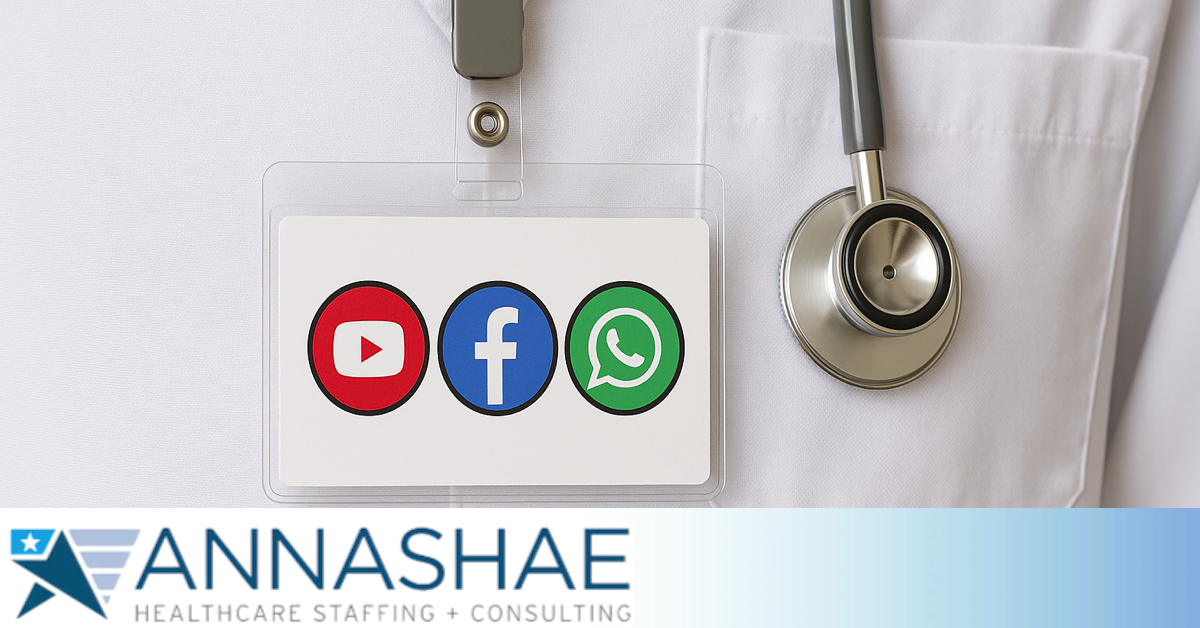
11 Jun How to Leverage YouTube, Facebook and WhatsApp for Maximum Career Growth as a Doctor in 2025
In today’s digital age, medical practice and career development are being reshaped by social media and online platforms. For doctors across various specialties, leveraging tools like YouTube, Facebook, and WhatsApp can provide numerous benefits in professional growth and expanding their networks. Here are the top three ways each of these platforms is revolutionizing career development for medical professionals.
1. Continuing Education through YouTube
YouTube has transformed into a powerful library of knowledge and resources. For doctors, it serves several functions:
– Access to Expert Insights: With countless channels dedicated to medical education, professionals can stay updated on the latest research, innovative treatments, and procedural skills. Established physicians and institutions share webinars, surgical demonstrations, and case studies that doctors can learn from at their convenience.
– Networking Opportunities: Many educational channels host live discussions and Q&A sessions, allowing doctors to engage directly with specialists around the world. This interaction fosters connections that can lead to mentorship opportunities or collaborations in research.
– Diverse Learning Styles: Videos cater to different learning preferences, making it easier for busy professionals to absorb complex information in a format that suits them. This flexibility encourages lifelong learning among doctors, which is crucial in the ever-evolving field of medicine.
YouTube can be a helpful tool for medical education, especially for visual learners and those seeking demonstrations of surgical procedures or medical techniques. While YouTube can be a valuable resource for doctors, it’s not inherently safe or a reliable source of medical information. Doctors should use caution when relying on YouTube for medical knowledge and advise patients not to depend on it solely for health information.
2. Building a Professional Community on Facebook
Facebook might not be the first platform that comes to mind for professional development, but its group feature can be invaluable for doctors:
– Specialized Groups: Doctors can join specialty-specific groups where they can share experiences, ask questions, and seek advice from colleagues facing similar challenges. This sense of community can promote collaboration and innovation in patient care.
– Networking and Referrals: Engaging with fellow professionals can lead to referrals and collaborative opportunities. Building genuine relationships within these groups can result in expanded practice visibility and access to potential new patients.
– Event and Resource Sharing: Many groups update their members on upcoming professional conferences, webinars, and workshops, along with sharing valuable resources like articles and guidelines. This ensures that doctors remain informed about the latest trends and best practices in their respective fields.
While Facebook can be used by doctors, it’s crucial to be mindful of the risks and ethical considerations involved. Doctors should be cautious about sharing patient-specific information or offering clinical advice on Facebook because this could violate confidentiality and professional boundaries. They should also consider the potential consequences of posting unprofessional content, which could damage their reputation.
3. Instant Communication via WhatsApp
In a fast-paced healthcare environment, time is of the essence. WhatsApp can play a critical role in enabling efficient communication:
– Quick Consultations: Doctors can instantly connect with colleagues for quick consultations or second opinions, which is particularly useful in urgent medical scenarios. This rapid communication can lead to better patient outcomes.
– Group Chats for Collaboration: Creating group chats with peers or multidisciplinary teams can facilitate discussions about patient care, treatment plans, and case reviews, making teamwork more streamlined and effective.
– Sharing Resources: Doctors can easily share articles, research papers, or even images and videos related to patient care. This form of communication fosters continuous learning and collaboration among teams.
WhatsApp is generally not considered safe for doctors to use for transmitting or storing patient information due to HIPAA compliance concerns. While it offers end-to-end encryption for messages, this doesn’t guarantee HIPAA compliance. Healthcare professionals should use HIPAA-compliant platforms for Protected Health Information (PHI).
Enhance Your Medical Career with Social Media
Incorporating platforms like YouTube, Facebook, and WhatsApp into everyday professional practice can greatly enhance career development for doctors, regardless of their specialty. By tapping into the vast resources and networking opportunities these platforms offer, medical professionals can stay abreast of industry advancements, build a strong professional community, and communicate effectively with peers. Embracing these tools is not just about staying current; it’s an investment in their career and the future of patient care.
Whether you’re a seasoned physician or a recent graduate, now is the time to harness the power of social media to enhance your professional journey. Explore these platforms today and discover the potential they hold for advancing your medical career.
Level-up your career and your healthcare staffing: partner with Annashae.com to connect with locum tenens opportunities and physicians to maintain quality patient care. Let’s enhance health systems’ efficiency together.




